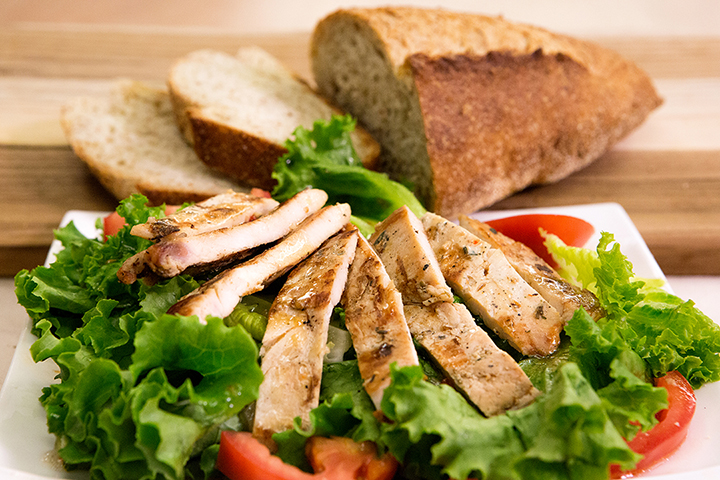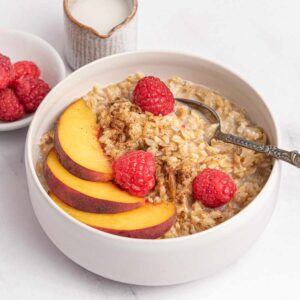
Carbohydrates
Carbs are our most important source of fuel when doing any kind of activity . . . even when using the gray matter between our ears.
Our bodies get its energy from two main sources of carbohydrates – glucose or sugar and glycogen. Glucose helps to protect your muscles and joints from breaking down or feeding on itself by being the first go-to source of energy.
Our skeletal muscles and liver store glycogen, the other source of energy our body uses, when there is insufficient glucose or sugar (see below for further discussion on glycogen).
N.B. Each gram of carbs supplies us with 4 calories of energy.
Carbs can be broken into simple and complex sugars. Simple sugars would be the kind found in sodas, candies and cookies. It’s also called glucose and is found throughout your body.
Complex cabs or starches, on the other hand, are carbohydrates formed by combining simple sugars. They can be found in whole grain breads, pastas and starchy vegetables like corn, pumpkin and potatoes.
To prevent pre-diabetes – simple sugars should be reduced to less than 10% of your diet at any given meal. The bulk of your carbs should be of the complex variety.
Glycogen
Our liver and all our major muscles store glycogen, which is another form of carbohydrate, as a backup. When the immediate source of energy (glucose) is used up, our bodies turn to this reserve.
Glycogen is used in conjunction with glucose to power many of our bodily functions such as walking, breathing, digestion, and etc. This makes it important to always have a reserve.
Although we need to have this reserve, it can be an issue for sedentary people. You see, the foods they eat that are broken down to carbs, will continue to buildup because of a lack of activity, and eventually lead to insulin resistance.
Physical activity will activate your body to use this stored sugar. The more intense your workouts the faster your body deplete this sugar. This makes it really important to restore your glycogen supply after a good run or doing extended resistance exercises.
Your source of carbs is very important for optimum health. Fresh vegetables, fruits and grains are excellent carbs that can be consumed regularly without them being detrimental to your health. It’s recommended that up to 60 % of the foods you eat be in the form of good quality carbohydrates.
One of the benefits of eating complex carbs is that they are nutrient dense and usually contains dietary fiber. As you know fiber is a substance found in plants that can’t be broken down by the body. It passes through our digestive system and helps to clean the pipes . . . so to speak. We should be consuming on average 30 grams of fiber each day. The best sources are fruits, veggies, grains and legumes.
Researchers have developed an index to measure the effect of carbs on our bodies. It’s called the glycemic index . . .
The Glycemic Index (GI) and blood glucose
When we eat any carb source it will cause our blood sugar to rise. The rate at which this rise happens is called glycemic index.
Foods with a high GI (55 and above) will result in quick rise in blood glucose whereas foods having a lower GI tend to have more bulk and release glucose slowly. These include foods like apples, beans, cantaloupes, oats and etc. This slow release is helpful in keeping blood glucose under control. Any food rating less than 55 in the G.I. is considered low to moderate.

Eating low glycemic foods is also ideal for losing weight and increasing insulin sensitivity. These types of food should become a part of your daily diet. Other examples of low GI foods are leafy green veggies, whole wheat bread, bran flakes, brown rice, whole fruits (not from a package), whole nuts, sweet potato (yams), low-fat yogurt.
Before starting your workout routines, I recommend having a natural source of carb. I like to have fruits at least one hour prior to any intense exercises. I eat a fast burning fruit and a slow release one. This helps to preserve muscle tissue and allow me to sustain intensity for longer periods.
All recommendations given here are subject to adjustments based on age, sex, height, weight and how intense you work out. Find your sweet spot and build from there.
If you are a runner then you want to increase your intake of higher glycemic foods to sustain your endurance during long runs. However, resistance or weight-bearing exercises would call for low to medium rate of glucose release to supply needed energy.
Get more information on combining proper carbohydrates with activity to prevent pre-diabetes by visiting How to Prevent Pre-diabetes.

Pingback: How to prevent pre-diabetes | Does eating too much white rice lead to pre-diabetes?